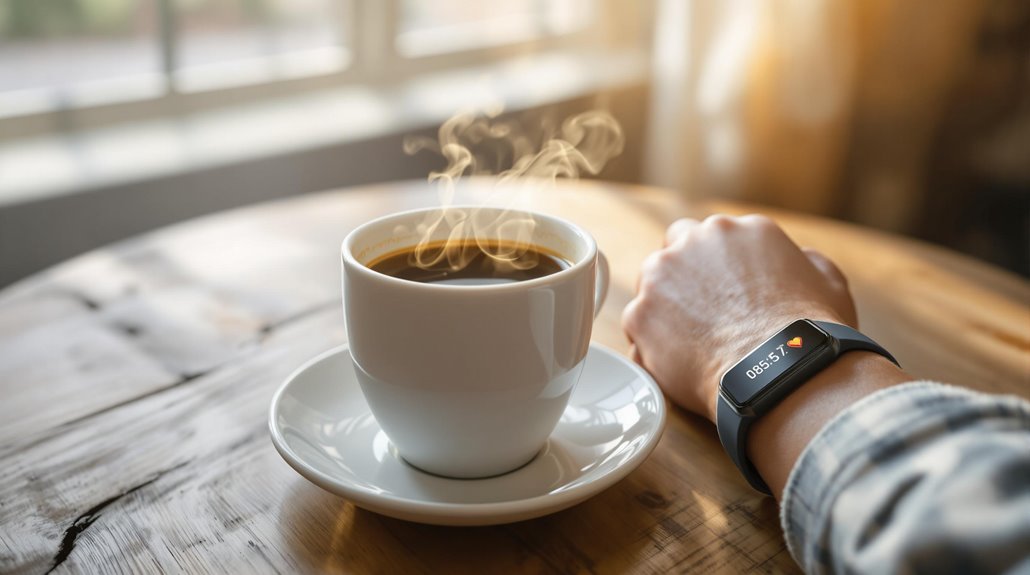







You've probably heard that coffee can keep you awake, but do you know why? Caffeine, the stimulant in coffee, blocks adenosine receptors in your brain, delaying the signals that tell your body it's time to sleep. If you drink coffee too close to bedtime, you might find yourself staring at the ceiling, wondering why sleep won't come. But it's not just about timing—your body's ability to process caffeine plays a role too. So, does coffee really cause insomnia, or is it more about how and when you consume it? The answer might surprise you.
Key Takeaways
- Caffeine in coffee blocks adenosine receptors, delaying sleep onset and reducing sleep quality, especially when consumed within six hours of bedtime.
- Consuming 400 mg of caffeine six hours before bed can cut total sleep time by over an hour and increase nighttime wakefulness.
- Chronic caffeine use worsens insomnia by disrupting the sleep-wake cycle and reducing restorative slow-wave sleep.
- Genetic variations in the CYP1A2 gene affect caffeine metabolism, with slow metabolizers at higher risk of caffeine-induced insomnia.
- FDA recommends avoiding caffeine at least eight hours before bedtime to minimize sleep disruption and improve sleep quality.
How Caffeine Affects Sleep
Caffeine disrupts sleep by blocking adenosine receptors in the brain, which prevents the buildup of sleep-inducing chemicals. This interference delays sleep onset, making it harder to fall asleep, and reduces sleep quality by shortening the time spent in restorative slow-wave sleep. Even if you don't feel it, consuming caffeine within six hours of bedtime can cut your total sleep time by up to an hour. Studies show that 400 mg of caffeine taken six hours before bed markedly lowers sleep efficiency, increasing nighttime wakefulness and reducing overall restfulness. Over time, chronic caffeine use can worsen sleep deprivation, creating a cycle where you rely on caffeine to counteract daytime fatigue caused by poor sleep. This dependency further degrades sleep quality, making it harder to achieve deep, restorative sleep. By disrupting adenosine receptors, caffeine not only delays sleep onset but also fragments sleep, leaving you feeling less refreshed. To protect your sleep quality, consider how caffeine's effects linger and impact your bedtime routine, especially if you're prone to chronic sleep issues.
Caffeine's Half-Life and Timing
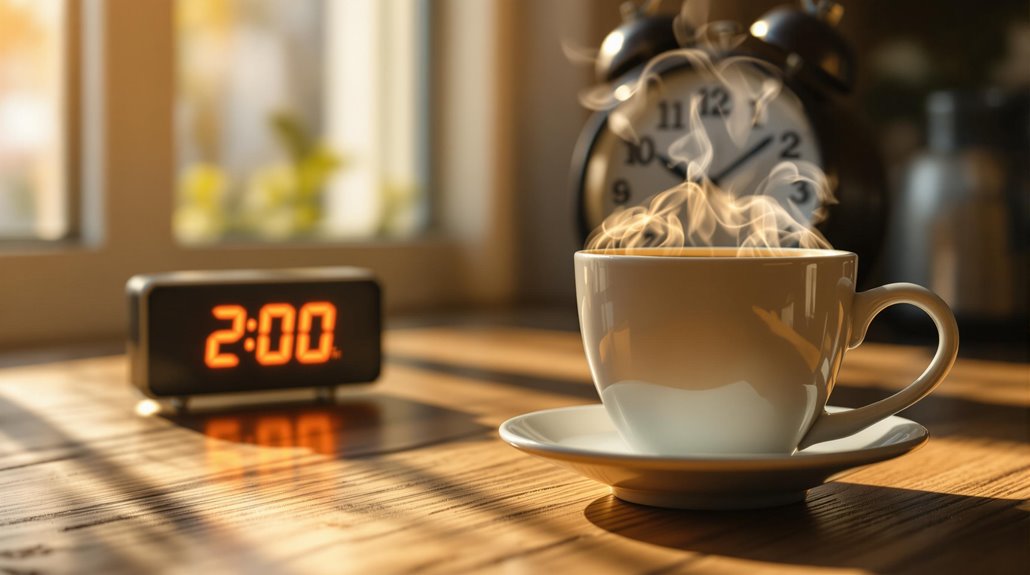
The time it takes for your body to process caffeine can vary considerably, with its half-life ranging from 2 to 12 hours depending on individual factors. Genetics, smoking, and pregnancy can all influence how quickly your system eliminates caffeine. For example, smokers metabolize caffeine faster, while pregnant individuals often experience a prolonged half-life. Timing your caffeine intake is critical to avoid sleep disruption. Research shows that consuming caffeine even 6 hours before bedtime can reduce total sleep time by over an hour. The FDA recommends avoiding caffeine at least 8 hours before bedtime to minimize its impact on sleep. Studies confirm that caffeine taken 0, 3, or 6 hours before bedtime markedly disrupts sleep, with the most severe effects occurring when consumed closest to bedtime. To prevent sleep issues, consider your caffeine half-life and adjust your intake timing accordingly. If you're sensitive to caffeine or have a slower elimination rate, you may need to cut off consumption earlier in the day. Understanding these factors can help you manage caffeine's effects on your sleep more effectively.
Safe Caffeine Consumption Limits

To maintain healthy sleep patterns and avoid overstimulation, it's important to stay within evidence-based caffeine limits. The Food and Drug Administration (FDA) recommends that most adults consume no more than 400 milligrams (mg) of caffeine daily, equivalent to about 4-5 cups of coffee. Exceeding this amount can increase the risk of sleep disturbances, anxiety, and other side effects. If you regularly consume caffeine, monitor your intake to make certain it aligns with these guidelines. Keep in mind that the amount of caffeine in beverages and foods varies widely, so check labels to avoid unintentional overconsumption. For example, energy drinks or specialty coffees may contain considerably more mg of caffeine than a standard cup of coffee. If you have specific health conditions or sensitivities, consult your health care provider to determine a safe daily caffeine limit tailored to your needs. Staying within these boundaries helps minimize the risk of insomnia and supports overall well-being.
Caffeine's Role in Insomnia
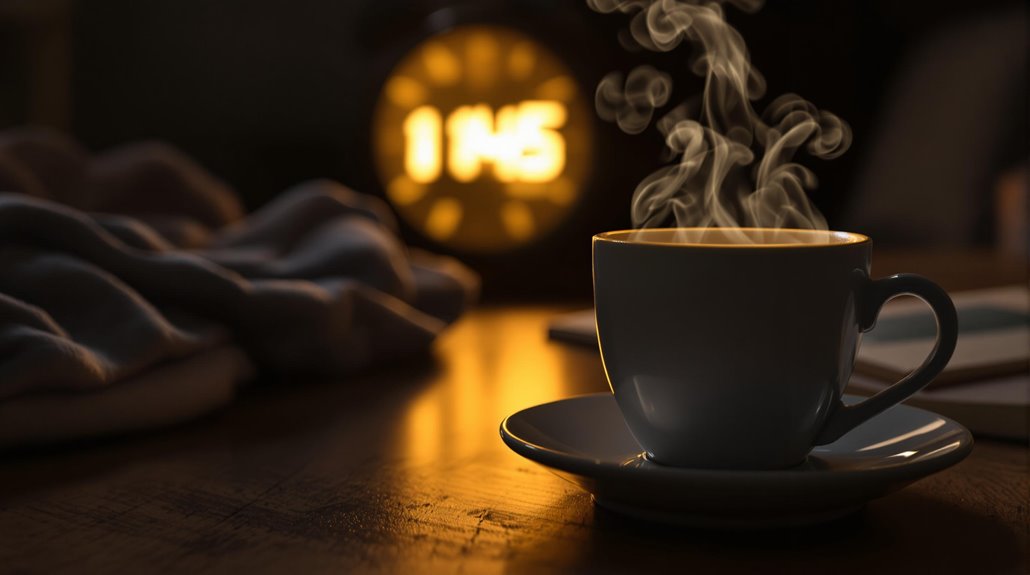
Many people don't realize how caffeine's effects on the brain can directly contribute to insomnia. Caffeine blocks adenosine receptors, preventing the buildup of this sleep-inducing chemical. When you consume caffeine close to bedtime, it disrupts your ability to fall asleep, increasing sleep latency and reducing total sleep time. Studies show that even moderate doses (200-400 mg) taken in the afternoon or evening can markedly alter your sleep architecture, reducing deep sleep and slow-wave sleep, which are critical for restorative rest.
Chronic caffeine consumption further complicates matters by disrupting your sleep-wake cycle. Over time, this can worsen insomnia symptoms, making it harder to achieve consistent, quality sleep. Research indicates that 88% of individuals who consume caffeine in the afternoon report at least one sleep problem, including difficulty falling or staying asleep. To avoid these issues, it's crucial to limit caffeine intake at least 6 hours before bedtime. By doing so, you can minimize its impact on adenosine levels and maintain a healthier sleep-wake cycle, reducing your risk of insomnia.
Signs of Caffeine Overconsumption
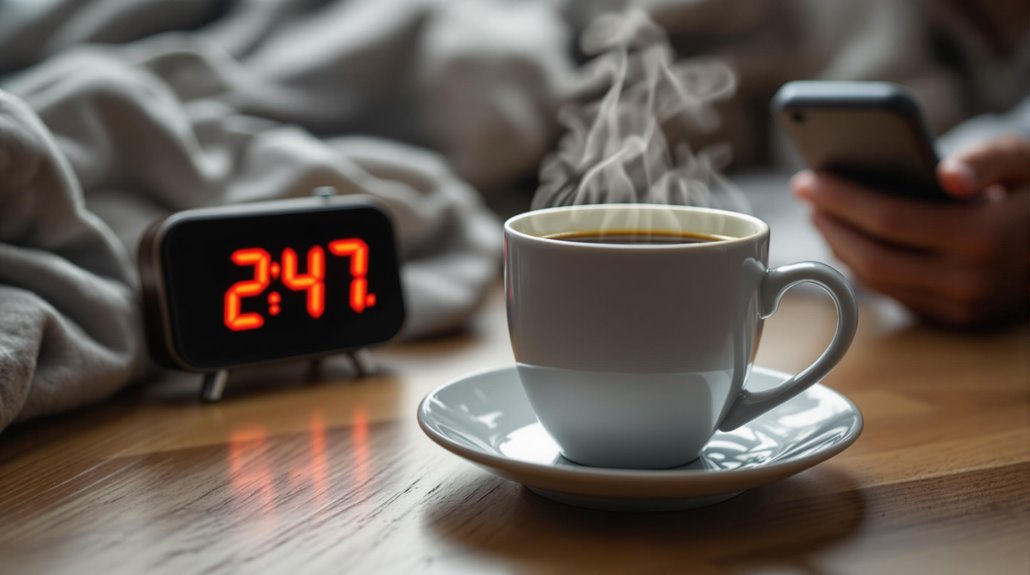
Frequently, overconsumption of caffeine manifests through noticeable physical and psychological symptoms. If you consume more than 400 mg of caffeine daily—equivalent to about 4-5 cups of coffee—you may experience anxiety, restlessness, and a rapid heartbeat. These symptoms often signal that your caffeine intake has surpassed safe limits. Jitteriness and nausea are also common indicators, as caffeine stimulates your nervous system, leading to muscle tremors and gastrointestinal discomfort. Additionally, frequent urination occurs because caffeine acts as a diuretic, increasing fluid loss and potentially causing dehydration.
Caffeine overconsumption can severely disrupt your sleep patterns, making it difficult to fall or stay asleep, a condition closely linked to insomnia. Elevated cortisol levels, triggered by excessive caffeine, further exacerbate stress and sleep disturbances. If you notice persistent headaches, irritability, or an inability to relax, these may also point to caffeine overuse. Monitoring these signs is vital, as they not only affect your immediate well-being but can also lead to long-term sleep and health issues if left unaddressed. Recognizing these symptoms early helps you adjust your caffeine intake to maintain ideal health and sleep quality.
Alternatives to Caffeine for Energy

For those seeking energy without caffeine, natural alternatives can effectively enhance alertness and focus. Start your day with morning light exposure, which helps regulate your circadian rhythm and boosts alertness naturally. Incorporate regular exercise into your routine, as physical activity increases blood flow and energy levels. If you feel fatigued, consider short naps of 20-30 minutes; they can restore energy without interfering with nighttime sleep. Staying hydrated is essential, as even mild dehydration can lead to fatigue, so drink water consistently throughout the day. A balanced diet rich in whole foods, including complex carbs, lean proteins, and healthy fats, provides sustained energy. Practices like yoga and relaxation exercises reduce stress and improve sleep quality, indirectly supporting daytime energy. Finally, circadian rhythm fasting, which aligns your eating patterns with your body's natural sleep-wake cycle, can optimize energy and focus. By integrating these strategies, you can maintain energy levels without relying on caffeine.
Caffeine Metabolism and Individual Differences
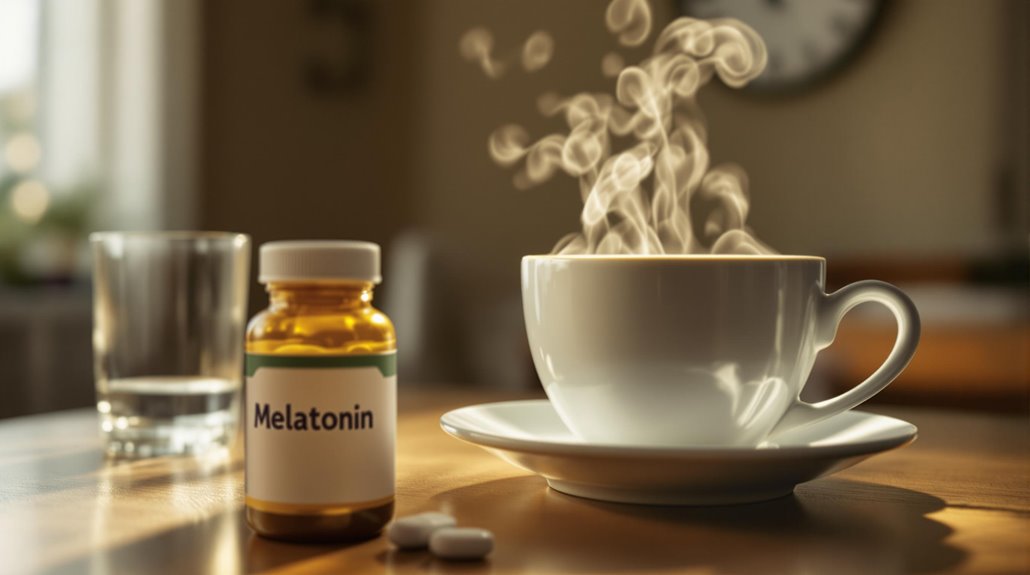
Your ability to metabolize caffeine depends on factors like genetics and lifestyle. Variations in the CYP1A2 gene can make you a fast or slow metabolizer, affecting how long caffeine stays in your system. Smoking, pregnancy, and regular caffeine use also alter its half-life, influencing your risk of insomnia.
Half-Life Variability Factors
Caffeine's half-life varies widely, ranging from 1.5 to 9.5 hours, due to individual differences in metabolism influenced by genetic, lifestyle, and health factors. Your caffeine metabolism largely depends on the activity of the CYP1A2 gene, which regulates liver enzyme activity. If you smoke, nicotine can increase liver enzyme activity, reducing caffeine's half-life by up to 50%. Conversely, pregnancy slows caffeine metabolism, doubling its half-life due to hormonal changes and reduced liver enzyme efficiency. Oral contraceptives and certain medications, like fluvoxamine, inhibit CYP1A2 activity, prolonging caffeine's half-life. Age also plays a role; as you get older, your liver's ability to metabolize caffeine decreases, leading to a longer half-life. Liver health is another critical factor—conditions like cirrhosis or fatty liver disease can impair enzyme function, further extending caffeine's presence in your system. Genetic factors, such as variations in the CYP1A2 gene, also contribute to these differences, making caffeine's effects highly individualized. Understanding these variability factors helps explain why caffeine affects people differently and why its impact on sleep can vary so markedly.
Genetic Influence on Metabolism
Genetic variations in the CYP1A2 gene play a key role in determining how quickly your body processes caffeine. If you carry the CYP1A2*1F allele, you're likely a slow metabolizer, meaning caffeine lingers in your system longer, increasing the risk of insomnia and sleep disturbances. Fast metabolizers, on the other hand, break down caffeine more efficiently, reducing its impact on sleep. Studies show that nearly 50% of the population has genetic variants that slow caffeine metabolism, making them more susceptible to its stimulating effects. These differences explain why some people can drink coffee late in the day without issues, while others experience insomnia even after moderate consumption. Genetic testing can identify your caffeine metabolism rate, helping you adjust your intake to minimize sleep disruptions. Understanding your CYP1A2 variants allows you to make informed decisions about caffeine consumption, especially if you're prone to sleep disturbances. By tailoring your habits based on your genetic profile, you can enjoy caffeine without compromising your sleep quality.
Long-Term Effects of Caffeine on Sleep

Frequently, chronic caffeine consumption can substantially alter sleep patterns over time, particularly by reducing deep, slow-wave sleep, which is vital for feeling rested. Over time, regular caffeine use disrupts your sleep-wake cycle, leading to a cycle of sleep deprivation and increased reliance on caffeine for alertness. This creates a feedback loop where you consume more caffeine to combat fatigue, further impairing your ability to fall or stay asleep. Studies show that long-term caffeine intake reduces total sleep time and increases nighttime wakefulness, worsening overall sleep quality.
As you develop tolerance to caffeine's alertness-promoting effects, you may need higher doses to achieve the same level of wakefulness, exacerbating sleep disturbances. Chronic caffeine use, especially in large amounts or late in the day, has been linked to increased insomnia severity. Even when consumed earlier, caffeine's half-life can linger in your system, interfering with restorative sleep stages. Over time, this pattern can lead to persistent sleep deprivation, making it harder to break the cycle. If you're experiencing worsening insomnia, evaluating your caffeine consumption and its long-term impact on your sleep-wake cycle is critical.
Tips for Reducing Caffeine-Related Sleep Issues

To address caffeine-related sleep issues, start by limiting caffeine intake at least 6 hours before bedtime, as research shows it can still reduce total sleep time by over an hour. Gradually reduce your caffeine intake instead of stopping abruptly to avoid withdrawal symptoms like headaches and irritability. If you're used to drinking coffee and tea late in the day, switch to herbal teas or decaf options, which have minimal caffeine and won't disrupt your ability to fall asleep. Keep track of your caffeine consumption and its timing using a sleep diary to identify patterns that may be affecting your sleep quality. Avoiding caffeine in the afternoon and evening can help you feel sleepy when going to bed. Additionally, prioritize consistent sleep hygiene practices, such as maintaining a regular sleep schedule and creating a cool, dark sleep environment, to counteract the adverse effects of caffeine. By managing your caffeine habits and monitoring their effects on sleep taken, you can improve your overall sleep quality and reduce disruptions.
Disclosure: As an Amazon Associate, I earn from qualifying purchases.




